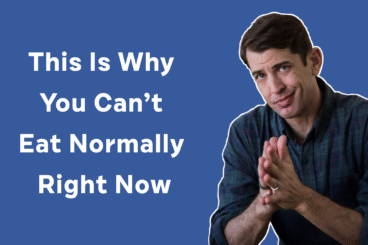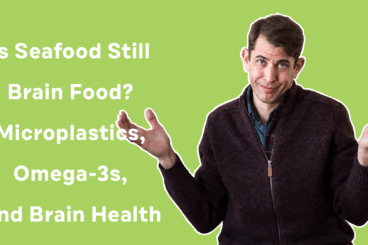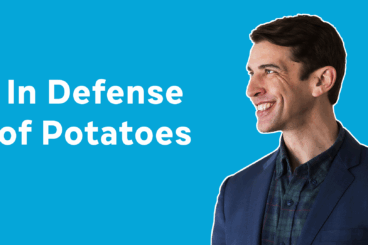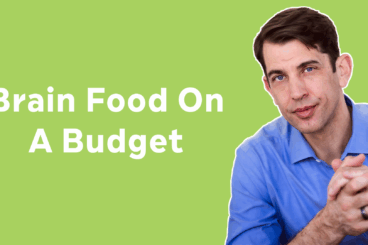Do you have a kid in college and you’re worried about their mental health? Maybe you’re also worried about their eating habits and you’re wondering what you should encourage them to eat other than healthy food to take care of their brain health and their mental health. I bet if there was some new research showing you the types of foods and meals that help your college kid prevent clinical depression or treat clinical depression, you’d want to know about it.
Well, I’m glad you’re here. I’m Dr. Drew Ramsey. I’m one of the only Nutritional Psychiatrists in the country. I’m a board certified psychiatrist and I spent over 20 years of my career taking care of patients, kids in college, parents with depression, anxiety, trauma, bipolar disorder, substance use. I’m a general psychiatrist. I’ve always been interested in how nutrition impacts our mental health and what foods I could recommend to my patients to eat to best take care of their brain health and their mental health.
So how does this apply to teenage mental health? Well, it’s very exciting. There have been three recent trials that I want to tell you about that are specifically about treating clinical depression in college kids. And actually for parents and for people who have college kids in your life and you’re thinking about how to help them, it kind of leads to a real simple intervention. I’m going to tell you about something that you can do something you can send these kids that will help them with their mental health. So I’ll tell you about it because all three of these research trials use this even though they look at different dietary patterns.
So let me just tell you quickly, why is this important? Well, because clinical depression, which is when we have a chronically low mood, disruptions in our sleep and our appetite. We have problems sleeping. This is one of the first signs in college kids. We also see kind of really dark thoughts or suicidal thoughts, a lot of irritability, a lot of problems with self-esteem and hopelessness and negativistic attitudes and a negative bias. Those are some of the core symptoms of depression and a lot of guilt as well.
That often hits in late adolescence. So this is late high school or early college. This is also when, as you know, your teen is out of the house, right? They’re making it on their own. They’re forming new social groups. They’re making new friends. They’re thinking a lot about their identity. They’re feeding themselves for the first time. And so this is when kids are particularly vulnerable and we want to give them all the tools that we can.
So this is where Nutritional Psychiatry is really exciting because all these kids are eating. So what do these studies show? There have been three of them. Let’s talk about the first one. First one was conducted by Heather Francis and her group in Australia. This is the first ever study to look at dietary patterns and using a dietary intervention to intervene with clinical depression in young adults.
So what they did is they looked at kids who were in a psychology class that had low moods and they also had poor eating habits. This intervention was fascinating because it was really simple. I’ll tip my hat. The thing that they do that I think all of us should do more of is they gave kids a healthy food hamper which included olive oil, nuts, nut butter, some spices. In each of these studies we’re going to talk about, they give the kids some food. And this signals something to kids, right? It says, hey, I’m not just giving you candy. Maybe I’ll give you some dark chocolate and some dried fruits, but I’m giving you things that are great for your mental health. This first study also had lots of information about Nutritional Psychiatry, the foods that were great and some meal plans. There were two, five minute follow-up calls. So they got all this information and then they followed up with two five minute calls. They found that in three weeks, kids had a significant improvement in their mood. Whereas kids in the control group who didn’t get the intervention, they didn’t have the same effect. Actually, their moods got a little bit worse. That was the first trial. Food hamper, eat a more Mediterranean style diet, more olive oil. So that’s exciting.
But what about a more robust randomized trial? That then dropped with the AMMEND trial. These were young men. It was really interesting. We don’t think about young men and their eating habits is something that we’re going to make a big difference on. Well, hey, we should check that bias. This trial looked at young men and just gave them two nutritional psychiatry counseling sessions. And essentially, when I talked to the researchers, she said, we increased olive oil consumption, we got them to eat more plants that they like. If they don’t like kale salads, don’t push that, right? If they like carrots and celery, if they like potatoes, think about healthy versions and get them eating more of those plants they like. And then we got them excited about beans and plant-based proteins like hummus.
So what happened in this trial of young men was really interesting. 100% of them shifted how they ate and reported some improvement in their mood. 36% of these young men go into full remission from their depression. And they’re not eating an extreme diet. They’re eating more plants. They’re eating more olive oil. They’re even dipping bread in olive oil. They’re just paying more attention to what they eat and they’re paying more attention to the processed foods in their diet and getting a lot of encouragement in these sessions. The lead researcher also noted, the young men also said “thanks for seeing me and thanks for paying attention. Thanks for caring about the fact that I’m not feeling very well and giving me some things I can do.”
So that’s the second trial, the AMMEND trial. 36% of young men go into full remission from offering a more Mediterranean style diet and you can really improve the Mediterranean dietary pattern score by increasing olive oil and increasing more nuts and beans and more plants. That’s just sort of fundamental to that dietary pattern.
So that’s two trials. This third trial is of a ketogenic diet just came out of Ohio State. There were 16 kids, about a third of them dropped out. Now this is a pilot study. So it’s not as strong as a randomized trial. It’s a small trial. But the idea here is of a ketogenic diet and this is a special type of ketogenic called the well formulated ketogenic diet. Ketogenic diets are diets that don’t have a lot of carbohydrates, less than 50 grams, so very low carbohydrate diets. You’ve probably heard about these diets, I’m sure the Atkins diet, South Beach diet, these are all ketogenic diets. They’re of interest to psychiatry and mental health professionals because for a long time, these were used and are used to treat pediatric epilepsy. And it’s interesting because there’s an overlap between bipolar disorder medications and epilepsy medications.
So there’s been a notion for a lot of us in psychiatry that when patients have some mood cycling or chronic depression or things like bipolar disorder maybe ketogenic diets might be able to help. The idea is maybe there’s less inflammation, maybe you’re promoting more neuro growth factors. There’s often weight loss with these diets that can be helpful for mental health. This pilot study at Ohio State just came out in 2025 and found significant improvement in mood. There was a 70% improvement in self-rating scales for mood. There was 69% self-rating scale with the PHQ-9, with the Hamilton rating scale, clinician rating scale, there was a 71 % improvement mood. There was a 36% increase in BDNF, brain drive neurotrophic factor. This is our major brain growth factor. So peripheral markers of this aren’t perfect, but that’s exciting to see there’s an increase. There was a decrease in inflammatory factors. A lot of these participants lost weight.
It was a 10 to 12 week trial. It was augmenting the medications and psychotherapy that these students were already getting but I thought it was a really exciting kind of next step. We did have another pilot keto trial for patients with severe mental illness. This looked mostly at individuals with bipolar disorder or schizophrenia. There were 23 patients in that trial that came out last year. This is now the second pilot trial.
So what’s the summary? Is it Mediterranean? Is it keto? Is it a food hamper? Is it talking about olive oil? And I think the answer is yes. If you’re a parent or you have college-aged kids in your life and you care about their mental health, talk to them about Nutritional Psychiatry, about how food impacts their mental health, about some of this research and ask them about how their food access is. We talk all about these specific foods, but we don’t talk enough about how food insecurity may be feeling uncomfortable in the cafeteria or not ever having picked all of your foods like this. Some people struggle with those issues. Food insecurity hugely increases the risk of depression. So start talking to folks about what they eat, what they like to eat, what they think is helping. Talking about the ideas that appeal to college students, like helping you with your focus, helping you with your sleep and your energy are all important conversations to have.
This isn’t a video about making sure that your kids are on a ketogenic diet. That’s really early research. It’s more to really let you know as a parent or as a guardian or as a teacher or as a mental health professional that there’s new research out about college students and what they eat. We’re finding huge impacts on their mental health, which means at every meal, in every college cafeteria, we have an opportunity to take care of brain health, to improve mental health, to be optimistic, to talk positively about all the options and all the nutritional options that are available in every cafeteria around America. You just have to look for them.
I hope this helps you with some optimism and some ideas about how to engage the college students in your life. If you’re a college student, I hope this helps you feel excited about the research and about what you can do to take care of your brain health and mental health.



